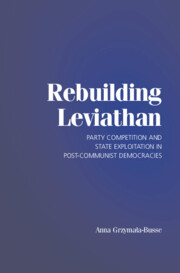Book contents
- Frontmatter
- Contents
- Acknowledgments
- List of Political Party Abbreviations and Acronyms
- 1 INTRODUCTION
- 2 COMPETING FOR THE STATE
- 3 DEVELOPING THE FORMAL INSTITUTIONS OF THE STATE
- 4 THE EXPANSION OF STATE ADMINISTRATION: PATRONAGE OR EXPLOITATION?
- 5 PRIVATIZING THE STATE: PARTY FUNDING STRATEGIES
- CONCLUSION
- APPENDIX A PEAK PARTY ORGANIZATIONS IN POST-COMMUNIST DEMOCRACIES, 1990–2004
- APPENDIX B DETERMINING STATE ADMINISTRATION EMPLOYMENT AND RATE OF GROWTH
- APPENDIX C ANCHORING VIGNETTES
- Bibliography
- Index
- Cambridge Studies in Comparative Politics
5 - PRIVATIZING THE STATE: PARTY FUNDING STRATEGIES
Published online by Cambridge University Press: 05 June 2012
- Frontmatter
- Contents
- Acknowledgments
- List of Political Party Abbreviations and Acronyms
- 1 INTRODUCTION
- 2 COMPETING FOR THE STATE
- 3 DEVELOPING THE FORMAL INSTITUTIONS OF THE STATE
- 4 THE EXPANSION OF STATE ADMINISTRATION: PATRONAGE OR EXPLOITATION?
- 5 PRIVATIZING THE STATE: PARTY FUNDING STRATEGIES
- CONCLUSION
- APPENDIX A PEAK PARTY ORGANIZATIONS IN POST-COMMUNIST DEMOCRACIES, 1990–2004
- APPENDIX B DETERMINING STATE ADMINISTRATION EMPLOYMENT AND RATE OF GROWTH
- APPENDIX C ANCHORING VIGNETTES
- Bibliography
- Index
- Cambridge Studies in Comparative Politics
Summary
Party finances are one of the most important, and, for obvious reasons, the least transparent chapters of the history of political parties.
Max Weber, Economy and SocietyFor observers of the post-communist transformation, the financing of political parties comprised one of the murkiest and most suspect aspects of democratic party politics. Scandals involving mysterious party donors, film producers, oil pipelines, fire-sale privatizations, and suitcases full of cash emerged in the 1990s, wrecking popular trust in political parties. However desperate or tragicomic, these forays show that securing funding was as controversial as it was pressing for the political parties involved. Nascent democratic political parties quickly had to find sources of material support, at a time when electorates were impoverished and fickle, fledgling private firms had little spare capital and were initially uninterested in supporting political parties, and party members were neither numerous nor generous.
For parties in search of capital, the state was a far more attractive and potentially stable source of funding. In addition to yielding formal subsidies, the impending privatization of state enterprises and holdings meant enormous informal opportunities. This is not to say that state funding or privatization by themselves indicate exploitation; however, leaving formal state funding unregulated and concentrated, pocketing resources from the processes of privatization, allowing discretionary access to state resources, and concentrating the benefits among the ruling parties are all symptoms of exploitation.
Political parties thus benefited both from their direct access to the state and its resources and from the indirect transfers they engineered.
- Type
- Chapter
- Information
- Rebuilding LeviathanParty Competition and State Exploitation in Post-Communist Democracies, pp. 182 - 221Publisher: Cambridge University PressPrint publication year: 2007

